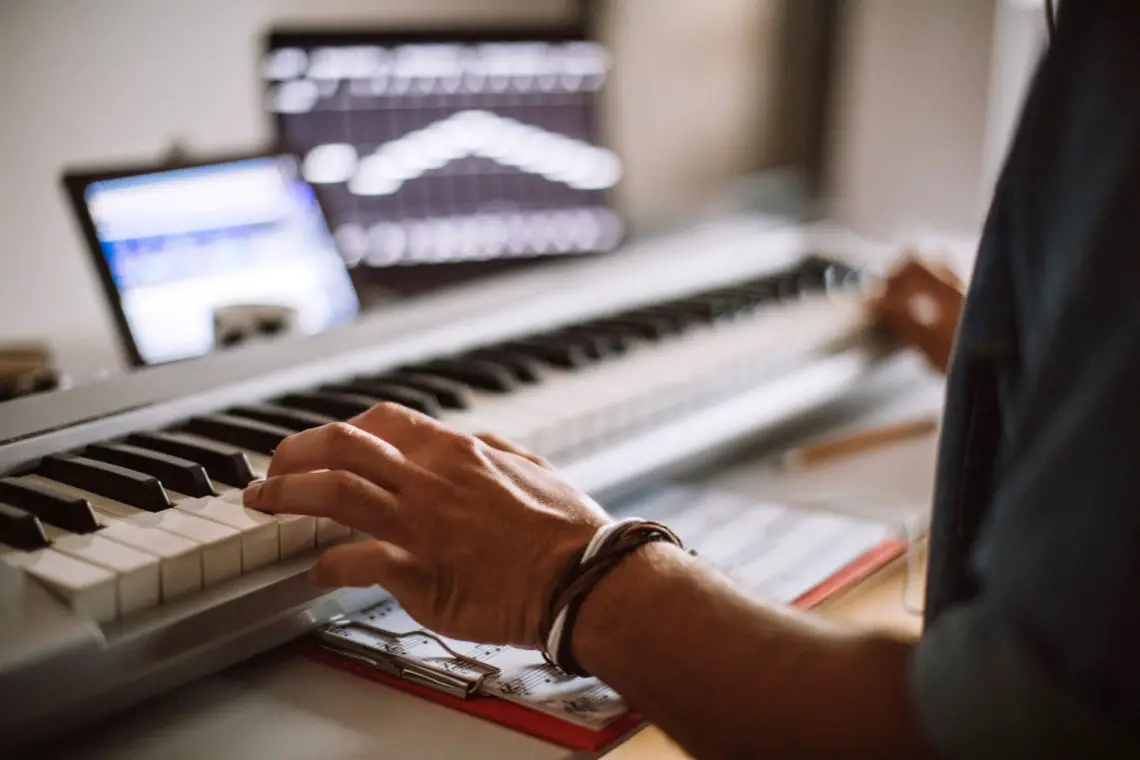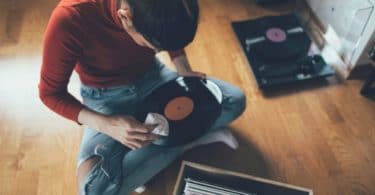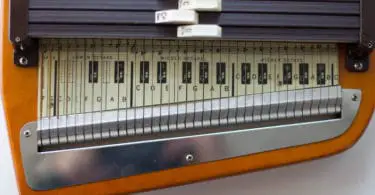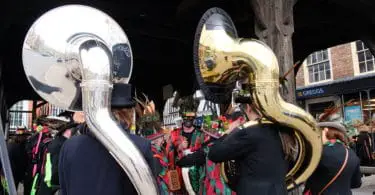What Is the Easiest Instrument to Learn?
Do you have a budding musician in your home? Or are you a beginner looking to learn how to play a musical instrument? You may be asking yourself, ‘What is the easiest instrument to learn?’
While it’s almost impossible to predict exactly how well an individual can learn to play any one instrument, some are much easier to learn than others.
So, before you run off to the music store looking to pick up a twelve-string guitar or order a french horn on the internet, let’s consider which is the easiest instrument to learn to play. I guarantee you the bagpipes are neither a good choice for the novice musician nor their practice audience.
So What Is the Easiest Instrument to Learn?
The easiest instrument to learn to play often requires a bit of subjectivity. It is pretty difficult to quantify ‘easiest’ without knowing a lot more about the student, their existing skills, and their goals.
Let’s say you are moving to a new school district, and you want your youngster to have a leg up in joining the jazz band as a freshman in high school. But they’re already in eighth grade, so time is short. Your question has now morphed into ‘what is the easiest band instrument to learn?’ And that is going to be pretty different than what is the easiest solo instrument to learn.
In that same band application, there is still a lot of room for more specificity. Does the band play modern music, classical, or jazz? Can your child rent an instrument from the school for additional practice outside of the classroom? To achieve something that is truly ‘easy,’ you need to really understand the lay of the land.
Beginner Instruments
To help inform your decision, we thought it might be helpful to discuss a few instruments that are common for beginners.
Ukulele
The ukulele is highly portable, fun to play, and relatively cheap. Their small size makes them easier to hold for smaller players. There are ample training resources available in print and online. And, you can pretty quickly put together enough chops to be the life of the party.
Harmonica
The harmonica is about the easiest instrument in the world to play. Place it to your lips and blow, move it around, and music flows out.
There are no valves, no fingerings, no complex chords. It is also extremely portable, very inexpensive, and convenient to pick up. You can play wherever you want, your fingers won’t get sore or blistered, and it can be a lot of fun. It might not be the most involved instrument, and there isn’t a lot of theory involved in playing it, but it is easy to learn and play.
Violin
The violin is relatively easy to learn to play, and that’s probably part of the reason it is popular for beginners the world over. It is lightweight and easy to hold, though using the bow takes some getting used to. You can find a decent starter model at an inexpensive price point. You don’t need an amplifier either.
But, one of the things that makes the violin a bit harder to learn to play is that it doesn’t have frets like a guitar. Instead, you have to learn to identify the proper finger placements by ear. But, that can make it easier to learn simple songs and get started playing them.
Trumpet
The trumpet is pretty straightforward. Blow into it, finger the valves, and you are making music. But, it takes a lot of effort to build up your lungs to sustain notes. And the fingering is not always easy to do. So, especially at the beginning, the learning curve can be a bit steep. But, pretty quickly, you are going to be able to carry a tune, and the trumpet is designed to be the melodious star in the show.
Drums
The drums seem easy to play to most novices. But, playing on a full-size acoustic set is very difficult. A smarter option might be to try out some bongos and a tambourine and learn the basics of percussive rhythm. Then perhaps it’s time to move on to an electronic drum set. Playing the drums well requires a bit of instruction as well, as they are one instrument that really demands a lot of technique.
Guitar, Keyboard, Bass
Lumping all three of these distinctive instruments into the same summary might seem odd. But, these are probably the ‘big three’ when it comes to popularity. And, as you might guess, that means that the tools for learning how to play them are the most accessible.
It might be hard to find an expert in your area to offer bagpipe or piccolo lessons. But I bet there is a local guitar, keyboard, or bass player who is offering lessons. And, if you are more of the DIY type, there is a deep trove of material online for teaching yourself how to play any of the three.
The guitar and bass are instruments that lend themself to beginning learners. They are affordable on any budget, and with a little bit of practice, you can learn how to play them pretty quickly. But, they do have some drawbacks. Blistered fingers, broken strings, and high expectations can quickly sour a new student.
Therefore, I think that the keyboard is the easiest instrument to learn. You don’t need to learn how to tune it. You don’t need to learn how to change the strings. All of the notes are right in front of your eyes in a linear arrangement. And, you can buy one that is the right size for you and your skill level without breaking the bank. You don’t have to start out with an 88 key monster with foot pedals!
Consider Other Factors
Besides the ease of learning a particular instrument, there are many factors to consider before investing your time, energy, and money in one. Answering, ‘What’s the easiest instrument to learn?’ sometimes requires fleshing out some more details first.
What Do You Need Out of This Instrument?
Before even considering what instrument to buy, consider what you will be asking it to deliver. Are you looking for something to noodle around with and distract yourself? Are you trying to compliment a friend’s instrument playing with your own? The answers to questions like these will reveal different answers as to which instrument is best for you.
Let’s suppose you have two friends who already play guitar. You want to join them for their jam sessions. Maybe it makes more sense to avoid getting another guitar in the mix and you should start with a complementary instrument that fits in well with their playing style, like a bass guitar.
Or, perhaps you’re buying an instrument for your kid. You know the easiest instrument to learn for a child is probably not the same as for an adult. You want it to be relatively easy for them but also to instill exemplary musicianship. The guitar is perhaps not a good choice because guitar players have created a whole system of playing (tablature) to avoid reading music.
And, if you aren’t necessarily determined to make your new instrument a centerpiece of your life, you might want to avoid some. A set of drums are a significant investment, requiring an enormous footprint, and they make a tremendous amount of noise. An upright or grand piano is a lifelong partner. Once it’s in, it rarely moves out.
Consider what you need out of an instrument before you run off and buy one.
What Skill Level Do You Have Now?
If you already have some musical skills, you might be able to pick up any musical instrument pretty quickly. It is sort of like riding a bike. Even after a long period without playing, things tend to come back quickly. So, maybe it will be relatively easy for you to apply the skills you learned at your piano lessons 20 years ago to your new trumpet.
On the other side of that same coin, if you are a complete novice, maybe you need to scale back your approach and expectations. Instead of buying those bagpipes on day one, maybe invest in just a chanter to train with initially. This will help you gauge your skill level, your commitment, and your enthusiasm.
Similarly, there are a lot of instruments that can be very rewarding to practice with and play. Many don’t come with high expectations or the pressure of an audience. For instance, if you have a new piano, everyone will see it and expect to hear it! Whereas you could slip off to your back porch with a harmonica, and no one would be the wiser.
Your current skill level can be a big part of determining the easiest musical instrument to learn. And, if you’re trying to refresh your skills without an instructor, you might even want to focus on what might be the easiest instrument to learn on your own.
Will Your New Instrument Keep Up With You as You Learn?
One potential pitfall of buying any new instrument is that it might not be able to progress along with your learning. If we go back to our piano example, we have an instrument that is a life-long investment that will never have any trouble keeping up with you. Everything needed to grow into a concert pianist is right there.
But can a bongo drum offer the same scalability? No, of course not. That’s not a knock on bongo drummers, but most accomplished drummers who started out on bongos graduate to other drums and complete sets, as well as various other percussion instruments.
Another way to look at the same dynamic is by comparing a bugle to a saxophone. You might become the best bugler in the world, but when you do, you are basically ready to leave your instrument behind. A saxophone will take more time to learn, but it could be explored for many years.
Where Will You Be Practicing?
This is a huge factor in determining what is the easiest instrument to play. If you will be practicing in your small apartment surrounded by curmudgeonly neighbors, it won’t be very easy to blast out the solo to Pink Floyd’s “Comfortably Numb” at high volume. The same goes for acoustic drums.
Or, if you’re going to be spending the summer at a lake house, and you want to take up practicing an instrument, the easiest wind instrument to learn won’t be a tuba. Instead, focus on something smaller and more portable, lick a trumpet.
Do You Need to Transport Your Instrument?
If you are going to be moving around with your instrument, portability is a key factor in determining what is the easiest musical instrument to learn.
Common Questions
Some of the most common questions new musicians have are pretty difficult to answer. Simply put, everyone is unique! Accordingly, it isn’t always easy to make a definitive statement like, ‘Buy this keyboard. It’s the easiest instrument for you to learn to play.’
But, we do have some common questions that we can help you answer.
How Long Will It Take Me to Learn?
When I first learned how to play the guitar, I was lucky enough to have a nice new Ibanez 6-string. I asked my instructor how long it would take me to be able to play. He responded by promising to teach me every note on the guitar in my first lesson. No way was this possible.
Amazed, I followed along intently as he explained the musical theory behind the chromatic scale. After I learned the names of each of the strings (EADGBE) and the musical system of steps and half-steps, I could indeed play and identify every note on the guitar. Yes!
But, since my teacher was a theory-first teacher, I had a lot more work to do before I could even begin to learn how to play a song. My friends knew how to play the chords to Black Sabbath’s “Ironman” after their first lesson, but I learned about musical theory instead, so I was just playing a bunch of notes, not a song.
My anecdote is a long-winded way of saying it depends on the teacher, the student, and the instrument! If you’re asking about the easiest instrument to learn on your own, your teacher might be a Youtube video, but you are still very much at the mercy of the quality of your instructor.
They say that it takes 10,000 hours to learn to master a skill. Some people claim that to be a myth, but practice does indeed make perfect. And it doesn’t matter which instrument we’re talking about.
But, don’t be discouraged. With dedication to your practice sessions, you should expect to play a rudimentary melody within days. Then, you can build on that to play a more complicated tune skillfully with just a few weeks of practice.
Within two months of daily practice, you should have a few complete, simple songs under your belt. One tip for a novice student is to pick practice songs that are easy to voice on your instrument. For example, don’t try to start your guitar training with Bruce Hornsby’s “The Show Goes On,” which is very hard to play even on its native instrument, the piano.
Within a couple of years, you could easily be playing the swelling refrains of the chord melody to ‘Somewhere over the Rainbow’ on your guitar or jamming along with the rest of your jazz band on the saxophone. It will always take time and dedication to achieve a lofty goal.
What Is the Easiest Instrument to Play?
The easiest instrument to play is hard to describe because there are a few that equally meet the criteria of ‘easiest.’ Bongo drums, the xylophone, and the tambourine are all examples of instruments that are exceedingly easy to pick up and make noise with. And, with the bare minimum of practice, the noise you make could sound pretty good.
Now, those are all very entry-level instruments, but they can end up being an integral part of a song or a band. So, they are good places to start if you are looking for the easiest instrument to play.
What Is the Easiest String Instrument to Learn?
The easiest string instrument to learn is probably the ukulele. With nimble fingers and a few quick practice sessions to get used to holding it, a complete newbie can be strumming a rhythm or fingering a simple melody quickly.
One of the features that make the ukulele so easy to play is that it is smaller and easier to hold than many other stringed instruments. It’s easier to finger the strings, and you don’t need to be as dextrous or strong to do so. It is also more portable and much less expensive than full-size guitars or basses.
All these factors make it relatively easy to play. And, it can also serve as a good stepping stone to, or gauge of, long-term interest. You might find that you run out of things to do on a ukulele pretty quickly if you’re practicing a lot. Then it might be time to upgrade to a bass or guitar.
What Is the Easiest Instrument to Learn for a Child?
The easiest instrument to learn for a child is probably a small-ish keyboard with about 32 keys. You don’t need a full-sized piano to get started, and it’s probably a good idea to learn on something smaller when you’re first starting. The beauty of a keyboard is that it is all laid out in front of you.
You do need to learn how to set your hands and how to find middle C. But, once you have the basics, all of the notes are right there in front of you and arranged in a straight line. Half-steps and whole steps are easy to see (white keys versus black keys). You can be playing simple melodies (think ‘Happy Birthday’ and ‘Twinkle Twinkle Little Star’) in minutes. And, fingering a chord isn’t an abstract concept like when doing so across multiple guitar strings.
Some people might say that learning the keyboard is problematic because it requires reading music. But, do you want to start your musical journey by ‘cheating?’ Understanding the fundamentals of music theory and reading notes on staff is not hard. And, by doing so, you’re laying the foundation for a lifelong musical journey. Plus, reading music is a pretty fundamental skill for even a novice musician.
If you want to help foster creativity and mental agility in your child, starting with a keyboard is not only relatively easy, but it will set them on a solid musical foundation for the rest of their life.
Plus, you are not required to learn how to read music to bang out a song on a keyboard. Because of the simplicity of the layout, the effortless dexterity of fingering the keys, and the help of some trick learning systems that eschew notes instead of numbers, a child can progress in their playing quite rapidly.
And one other huge improvement over a piano and most other instruments is that you can plug a set of headphones into a keyboard and minimize the sound output. That can be pretty useful for practicing without bothering others in the area.
Bottom Line
When someone asks what is the easiest instrument to learn to play, I am sometimes tempted to tell them that they’re all pretty easy to play, as long as you do so far, far away. This will spare my ears from their likely half-hearted attempts to learn how to play an instrument. Starting out your pursuit of something by trying to find the easiest road is not a recipe for success.
That said, the more information you have, the better decision you can make. Figuring out the easiest instrument to learn isn’t a bad idea. You just have to approach it with the facts, a plan for success, and some goals for the future. Regardless of which instrument you ultimately choose, you can learn to play it with some dedication and practice. Talent often takes a back seat to determination and grit!








Start the discussion at talk.hearthemusicplay.com